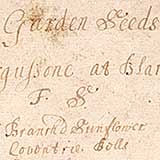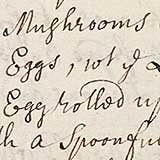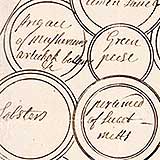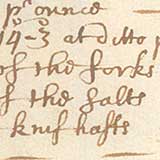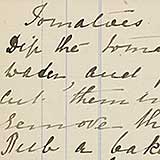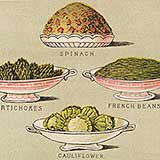
Vegetables
Tradition has it that the Scots do not eat vegetables.
But the evidence is that even in the poorest households a handful of kale was added to the broth, to provide flavour as well as nutritional value.
In the late 17th century, kitchen gardens attached to great houses were fashionable — and even status symbols — among wealthy Scots.
The popularity of kitchen gardens meant that a greater variety of vegetables was available to cooks. From this time vegetable dishes begin to appear on the tables of wealthy Scots.
Potatoes were eaten as a novelty by the gentry long before they provided winter fodder for animals. Later they became a staple foodstuff for the poor, often replacing bread — with dire consequences when the harvest failed.
While some Scots cling to the perceived stereotype, vegetables are more popular today than ever.
Increasing numbers of Scots now choose to 'grow their own' for maximum flavour and value.
First Scottish cookery book?
John Reid's 'The Scots Gard'ner', first published in 1683, gives advice on cooking fruit and vegetables as well as growing them.
The Scots Gard'ner
Seeds for the garden
Wealthy Scots fortunate enough to have their own kitchen garden were able to buy seeds and plants from specialist seedsmen and nurserymen.
Seeds catalogue
Mushroom Fricassee
The popularity of kitchen gardens meant a greater quantity and variety of vegetables was available to cooks.
Mushroom Fricassee
Supper at Saltoun
Vegetables were at first novelty dishes first served at supper time rather than at dinner, the main meal of the day.
Supper at Saltoun
Forks on the table
The introduction of forks for individual diners from the mid-17th century made eating solid dishes such as vegetables much easier.
Forks on the table
Salads in Glasgow
In his book '50 salads' of about 1892, Thomas Murrey refers to salads as 'The Prince of the Menu' and central to the modern meal.
50 salads
Tomatoes
When tomatoes were first introduced, people in Britain were suspicious of them. They were not widely accepted until the 20th century.
Tomatoes
Hints for cooking vegetables
In her book, 'Hints to young housekeepers', Margaret Black advises that 'vegetables ought to form part of every dinner, and it is as well to have a variety of them.'
Hints for cooking vegetables


